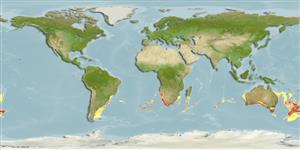分类 / Names
俗名 | 同种异名 | Catalog of Fishes(属, 种) | ITIS | CoL | WoRMS | Cloffa
Environment: milieu / climate zone / depth range / distribution range
生态学
海洋 底中水层性; 深度上下限 40 - 1500 m (Ref. 52180), usually 260 - 490 m (Ref. 52180). 深水域; 19°S - 55°S, 67°W - 173°W
Southwest Atlantic: Argentina. Southeast Atlantic and Western Indian Ocean: South Africa. Southwest Pacific: New Zealand and Australia (including Western Australia).
西南大西洋: 阿根廷。 東南大西洋與西印度洋: 南非。 西南太平洋: 紐西蘭與澳洲 (包括西澳大利亞).
Length at first maturity / 大小 / 重量 / 年龄
Maturity: Lm 70.6, range 59 - ? cm
Max length : 140 cm TL 雄鱼/尚未辨别雌雄; (Ref. 9563); common length : 60.0 cm TL 雄鱼/尚未辨别雌雄; (Ref. 52180); 最大体重: 63.0 kg (Ref. 54802); 最大年龄: 15 年 (Ref. 9072)
背棘 (总数) : 7 - 8; 背的软条 (总数) : 19 - 21; 臀棘: 3; 臀鳍软条: 15 - 17. Uniformly dark to black.
全黑色到黑色的。
Most common over or near rocky areas at 100-300 m (Ref. 9258). Generally, blue eye remain close to the sea bed during the day and move up in the water column at night, following concentrations of food (Ref. 6390). The fish are found over rough ground and at the edges of canyons and steep drop-offs. Blue eye appear to prefer cold water as part of their general behavior (Ref. 6390). Juveniles inhabit surface waters, sometimes in association with floating debris (Ref. 6390). Feed primarily on the pelagic tunicate Pyrosoma atlantica which is found near the sea bed during the day but dispersed throughout the water column at night (Ref. 7129, 30454). They also feed on squid, mollusks and crustaceans (Ref. 30455, 30454) and fish ranging from small lanternfish (Myctophidae) to large fish such as gemfish (Rexea solandri). Juveniles consume small planktonic and sedentary organisms (Ref. 30456). Marketed fresh and frozen; exported to Japan for sashimi; eaten steamed, fried, broiled and baked (Ref. 9988).
最常见在岩石区上面或附近在 100-300 公尺.(参考文献 9258) 通常,蓝色的眼保持接近海床在白天期间而且移动在水团上面在晚上, 跟随食物的集中.(参考文献 6390) 鱼被发现粗糙的底部之上而在峡谷与陡峭的海峭壁的边缘。 蓝色的眼似乎偏爱寒冷的水为他们的一般行为的一部份.(参考文献 6390) 稚鱼栖息于水表面, 有时伴随着漂浮的残砾.(参考文献 6390) 主要捕食大洋性的有被膜的 Pyrosoma atlantica 是发现白天在海床附近但是在水团各处散布了在晚上.(参考文献 7129,30454) 他们也吃范围从对大的鱼例如带 鱼 ( Rexea solandri) 的小灯笼鱼 (Myctophidae) 的乌贼,软件动物与甲壳动物 (参考文献 30455,30454) 与鱼。 稚鱼消费小的浮游生物与定栖的生物。 (参考文献 30456) 在市场上销售生鲜和冷冻; 输出至日本用作生鱼片; 清蒸, 油炸, 火烤了而且烧烤了.(参考文献 9988)
In Australia, spawning appears to be correlated with water temperature and nutrient upwellings (Ref. 7129). It appears that mature fish move up the continental slope into shallow depths (320-400 m) and aggregate in specific grounds for spawning (Ref. 6390).
There is no information on the number of eggs blue eye produce nor on the egg and larval stages of their life history (Ref. 6390).西南大西洋: 阿根廷。 東南大西洋與西印度洋: 南非。 西南太平洋: 紐西蘭與澳洲 (包括西澳大利亞).
Haedrich, R.L., 1986. Stromateidae. p. 842-846. In M.M. Smith and P.C. Heemstra (eds.) Smiths' sea fishes. Springer-Verlag, Berlin. (Ref. 4410)
人类利用
渔业: 商业性
工具
特别资料
下载 XML
网络资源
Estimates based on models
Preferred temperature (Ref.
123201): 4.1 - 16.4, mean 7.5 °C (based on 485 cells).
Phylogenetic diversity index (Ref.
82804): PD
50 = 0.5156 [Uniqueness, from 0.5 = low to 2.0 = high].
Bayesian length-weight: a=0.00891 (0.00498 - 0.01595), b=3.10 (2.94 - 3.26), in cm total length, based on LWR estimates for this species & (Sub)family-body (Ref.
93245).
营养阶层 (Ref.
69278): 4.0 ±0.57 se; based on food items.
回复力 (Ref.
120179): 中等的, 族群倍增时间最少 1.4 - 4.4年 (K=0.03-0.3; tm=5-7; tmax=15).
Prior r = 0.57, 95% CL = 0.38 - 0.86, Based on 3 data-limited stock assessments.
Fishing Vulnerability (Ref.
59153): Moderate to high vulnerability (51 of 100).
Climate Vulnerability (Ref.
125649): Moderate to high vulnerability (52 of 100).
Nutrients (Ref.
124155): Calcium = 10.4 [6.4, 22.4] mg/100g; Iron = 0.339 [0.162, 0.644] mg/100g; Protein = 18.3 [15.8, 20.3] %; Omega3 = 0.374 [0.208, 0.689] g/100g; Selenium = 30.4 [12.7, 67.0] μg/100g; VitaminA = 10.3 [2.3, 43.0] μg/100g; Zinc = 0.259 [0.181, 0.392] mg/100g (wet weight); based on
nutrient studies.
